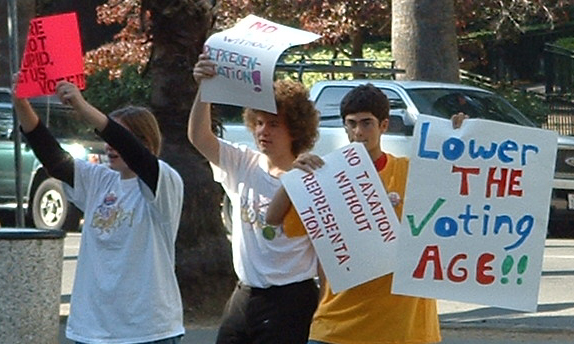 BBC News
BBC NewsBorrowing was £17.4bn last month, the second highest October figure since monthly records began in 1993.

Tim Clark
The setting of a legal age for anything is bound to cause anomalies: why can someone legally get married before they can drive a car, buy a National Lottery ticket or have a tattoo? Why can someone legally have sex at 16 but not when they are 15 years and 364 days old? The simple fact is that if age limits are deemed appropriate and necessary, then there must be an exact cut off point. The decision to lower the voting age to 16, however, appears both ill-conceived and totally unnecessary. Of course, not everyone at the age of 18 is thoroughly versed in party politics, enabling them to make an informed decision, but the democratic deficit is not going to be resolved by adding another 1.6 million electors who are, on the whole, unlikely to be able to contribute to debates about national policy. It goes without saying that much government policy has a direct influence of the lives of young people, but the key question is whether or not sixteen and seventeen year olds (not legally “adults” until the age of eighteen) are well placed to make mature and objective decisions about a whole range of issues (finance, foreign policy, defence etc) based on knowledge and relevant experience.
One supporting argument put forward by the government is that at 16, young people can earn a living, pay taxes, get married or join the army. But the obvious point is that the vast majority of 16-year-olds do not do any of these things. The cry of the American colonists in 1776 was, “No taxation without representation”; surely, of equal importance is, “No representation without taxation”: if you do not pay tax, why should you get a say on how other people’s hard-earned income is spent?
The fact that most youngsters do not pay tax is perhaps one reason why many tend to be left-leaning. The old adage that, “If you’re not a socialist before you’re twenty-five, you have no heart; if you are a socialist after twenty-five, you have no head,” is supported by recent polls which suggest that 33% of the new electorate would vote Labour and only 10% Conservative. (Would this have anything to do with the Labour government’s decision to lower the voting age?) If you speak to youngsters about their views on education, the NHS or youth services, the majority are often quick to call for greater government expenditure, until you then ask them from where the money is to come. Attitudes usually change and consternation sets in when they find that the taxman will be taking 20% of their future salaries, rising to 40% when they earn just over £50,000 (not to mention the additional taxes on their car, property, alcohol etc).
It is this ignorance of key issues which is most worrying (although this is not to argue that over 18s or even over 21s are fully conversant with the main issues of the day). From where are youngsters supposed to get their information? We know that newspaper circulation has massively declined and the number of youngsters watching traditional television news outlets is also low. Jon Sopal tells the story of a journalist asking some youngsters if they knew what an LP was, adding that he was from the 6 O’clock News; the response, they did know what an LP was but, “What’s the 6 O’clock News?”! This is not to argue you have to read a national newspaper or watch the BBC in order to understand the issues of the day, but youngsters must be able to access information that is as reliable and objective as possible (and that is not to suggest that either of these are not without their faults).
The question of from where do teenagers get their information is a crucial one, especially in the multi-media world in which we live. What of the influence of the likes of Andrew Tate and the misogynistic manosphere, and of other online “influencers”, many of whom are in their twenties and lack genuine life experience? The critically acclaimed Netflix series, Adolescence, about the appalling influence of social media on a fictional teenage boy, got the nation talking: are we satisfied that the internet and social media, for all their benefits, help to produce rational and objective youngsters? Think of the influence of Gary Lineker in 2023 when he accused the then government’s asylum policy of being, “not dissimilar to that used by Germany in the 30s”. Whatever the rights or wrongs of that government’s policies, Lineker’s analogy was simply factually wrong, yet millions lapped it up. [There is absolutely no comparison between saying, on the one hand, that Britain does not have enough houses, schools, hospitals or jobs to cater with unlimited migration and, on the other, saying that a specific group in society is vermin, cancerous, mistletoe, trying to take over the world and should be exterminated.] The irony, of course, was that Lineker then himself posted something blatantly antisemitic. Of course, just because someone is over 18 does not mean they are not susceptible to such ignorance but, surely, the younger and less experienced someone is, the more susceptible they are likely to be?
Although one’s sixteenth birthday does bring certain rights, two of them, getting married and joining the army, require parental permission. Why is that? Will youngsters look to their parents for guidance on how they should vote? Voting is not about putting a tick in a box: it is about making a mature, adult, conscious choice and realising that a tick in one box might mean something completely different to a tick in another and will, ultimately, impact on the lives of millions of people. An Edwardian argument against giving women the vote was that they would just do as their husbands “told” them(!): although this has clearly not been the case, from where will first-time teenage voters get advice (as well as a lift to the polling station as they will not be able to drive until they are 17, nor can they have a drink in the pub afterwards to discuss the results until they are 18)?
There is no doubt that Britain is facing serious democratic problems – fewer people are bothering to vote, even fewer are joining traditional political parties and there appears to be an almost universal lack of trust in and respect for many politicians. The answer is not to give the vote to a group of people who largely lack the knowledge, experience and responsibilities to make a significant difference to national political debate. If the current government seriously wants to support teenagers and to involve them in the political process, it should do two things: 1) concentrate on ensuring that every young person, regardless of background and ability, is given a world class education, helping them to become well educated, knowledgeable, skilled, resilient and hardworking young adults who can make a significant contribution to the future of this country. 2) introduce an effective and objective programme of political and current affairs education which will enable teenagers to make rational, objective and reasoned choices when they become adults at the age of 18. For this, the government will first have to resolve the national teacher recruitment and retention crisis.

Tim Clark’s bi-annual Better Schools Report Event at Guildhall, London. 10.10.2024 Photographer Sam Pearce/www.square-image.co.uk